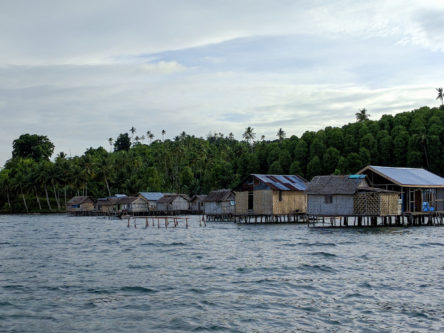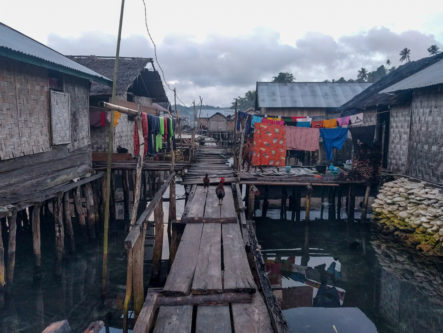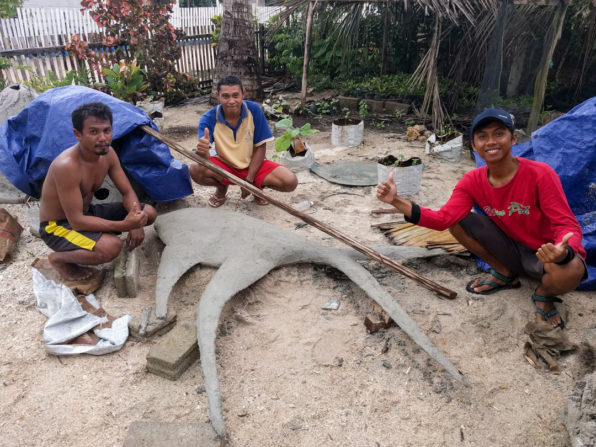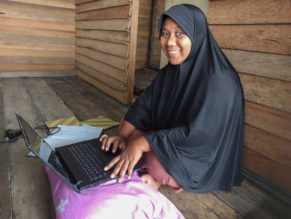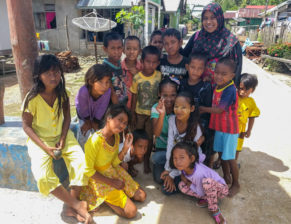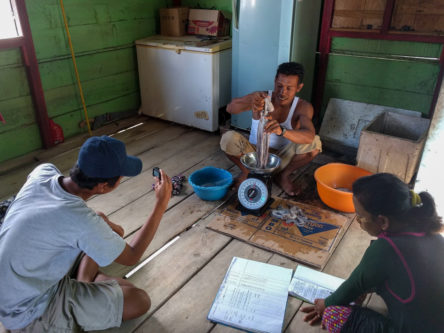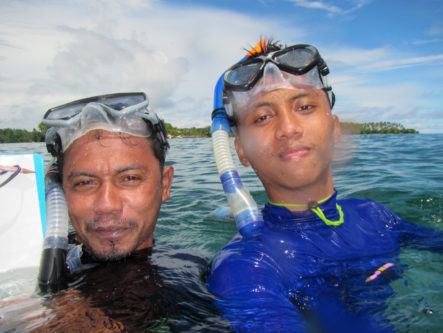Today I am in Popisi, a village in the north of Banggai Island off the coast of Central Sulawesi, where our partner organisation LINI (The Indonesian Nature Foundation) is developing conservation initiatives with the local Bajo community.
For the Bajo fishers in Popisi, octopus is their lifeblood providing vital income to support their families’ needs.
The Bajo people are former seafaring nomads of the Coral Triangle, most of whom still depend on fishing although they now live in stilted houses over the sea. For the Bajo fishers in Popisi, octopus is their lifeblood providing vital income to support their families’ needs.
With the support of LINI, the Popisi community is collecting vital baseline data on the local octopus fishery that will help them to make decisions about the management of their octopus resource. They are pioneering community-based fishery monitoring in the Banggai archipelago and want to inspire other communities to follow their footsteps.
My colleague Ratih (Blue Ventures’ PHE Support Officer for Indonesia) and I are joining LINI’s Banggai field team – Surya, and husband and wife team Saleh and Neni – on a routine support visit to learn more about their community-based initiatives.
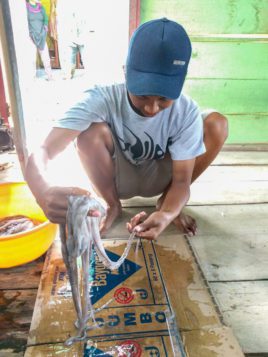
Surya determining the sex of an octopus
Surya, LINI’s project coordinator, wants to update us on progress in Popisi and he has a packed schedule for us. Originally from Bali, he studied marine sciences in Udayana University in Denpasar, and last year he joined LINI as an intern at their aquaculture training centre for the endangered Banggai cardinalfish (Pterapogon kauderni) in northern Bali. He is now taking over the technical supervision of LINI’s activities in Banggai, and has recently been visiting other fishing communities around the island to help him map the local octopus supply chain.
Before joining LINI in 2012, Saleh was a full-time farmer and fisher from Bone Baru. He is now trained in monitoring the Banggai cardinalfish and aquaculture techniques, and he leads LINI’s octopus-related community activities in Popisi and other fishing villages.
A group of kids runs to greet us, calling “Hello, Miss!” This is a nice change from the usual “Hello Mister” that you hear across most of Indonesia. They have learned how to greet me thanks to Neni, who is a local English teacher.
When she is not working, she accompanies Saleh to meet with the community data collectors, who are mostly women, and helps to input the data. She has worked hard to ensure the active engagement of many women in the community.
Neni manages all this whilst also raising her two-year old daughter Kia and cooking the most delicious meals for everybody staying at the site base in Bone Baru. For me, she is the backbone of all operations here.
The kids follow us down the narrow street that meets the pier. Lining the street are small shacks with ketek walls made of woven strands of bamboo, built either on stilts to raise them above the water or on piles of earth and dead coral. We make a turn and step onto the wooden pier that connects a group of houses on the furthest side of the village. The pier has seen better days and we must watch our step to avoid any loose planks or holes. The LINI field team leads the way, Neni holding Kia’s hand, who is dressed in an incredible bright yellow, full-body Pikachu outfit and has insisted, despite the treacherous steps, on walking.
Having months’ worth of catch data is an invaluable resource for fishers and community groups to understand the effectiveness of locally implemented management measures.
We stop in front of Herdi’s house, one of the local octopus fishers who has in recent years also become an octopus buyer. He is in charge of collecting octopus landings data together with Mama Ari, his wife.
Since February, data collection has become part of the buyers’ daily routine, contributing to establishing baseline information for the octopus fishery in Popisi. This community-based catch monitoring effort will enable the community of Popisi to make informed decisions about how and when to manage the octopus fishery. Having months’ worth of catch data is an invaluable resource for fishers and community groups to understand the effectiveness of locally implemented management measures.
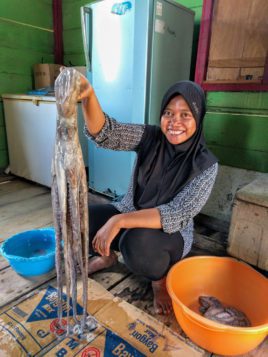
Ratih with a huge octopus!
Surya and Herdi are producing a video to showcase the community-based octopus fishing monitoring project in Popisi. Surya turns on his GoPro and Herdi demonstrates how to take all the measurements (sex, weight, length, and mantle length). Mama Ari sits next to him and writes down the information. They have been working on this video for weeks and Surya has gathered almost all the footage he needs to create the final edit.
Before we leave, Surya gives us a sneak preview. The film highlights the use of a tracking device installed on local fisherman Roni’s boat by LINI last June, with the aim of better understanding the fisher’s movements. It also shows fantastic footage of the Bajo fishers’ traditional lures manis manis and cipo, which mimic the movements of octopus and squid.
As the credits roll, we all applaud. “It is still a work in progress”, Surya explains modestly. “There’s still no scene of an octopus catch, but we’ll keep on trying. At least it’s a good excuse to get into the water!” he grins.
Now that my visit is coming to an end, I reflect on the encouraging progress the LINI field team has made in Popisi this year. What impresses me most is the great energy, skill and enthusiasm they put into their work. I’m confident that they will help local communities to successfully manage their octopus fishery to enhance landings and catalyse grassroots conservation activities.
We will continue to build on our valued relationship with LINI, exchanging learning, lessons and approaches to community-based conservation. All as part of our mission to expand the impact of the community catalyst model with our growing network of partners across the globe.
You can watch Surya’s film here.
You can also follow the work of LINI on Instagram and on Facebook.
All photos in this blog are by Claudia Matzdorf.


